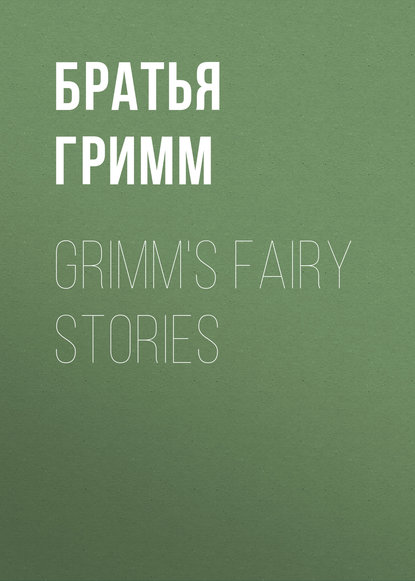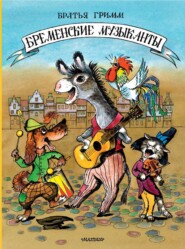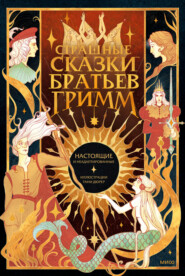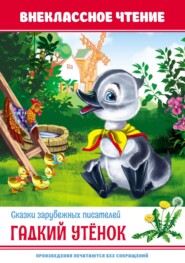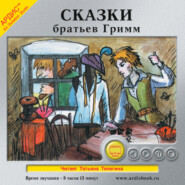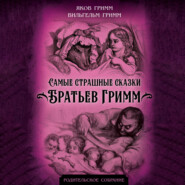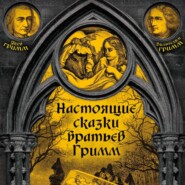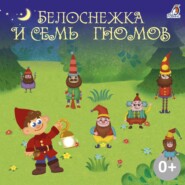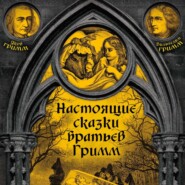По всем вопросам обращайтесь на: info@litportal.ru
(©) 2003-2024.
✖
Grimm's Fairy Stories
Настройки чтения
Размер шрифта
Высота строк
Поля
But the King, taking her by the hand, said, "I am not a merchant, but a king, thine equal in birth. It is true that I have carried thee off; but that is because of my overwhelming love for thee. Dost thou know that when I first saw the portrait of thy beauteous face I fell down in a swoon before it?" When the King's daughter heard these words, she was reassured, and her heart was inclined toward him, so that she willingly became his bride. While they thus went on their voyage on the high sea, it happened that the faithful John, as he sat on the deck of the ship, playing music, saw three crows in the air, who came flying toward them. He stopped playing, and listened to what they were saying to each other, for he understood them perfectly. The first one exclaimed, "There he is, carrying home the daughter of the King of the Golden Palace." "But he is not home yet," replied the second. "But he has her," said the third; "she is sitting by him in the ship." Then the first began again, and exclaimed, "What matters that? When they go on shore a fox-colored horse will spring toward them, on which he will mount; and as soon as he is on it, it will jump up with him into the air, so that he will never again see his bride." The second one asked, "Is there no escape?" "Oh, yes, if another mounts behind quickly, and takes out the firearms which are in the holster, and with them shoots the horse dead, then the young King will be saved. But who knows that? And if any one does know it, and tells him, such a one will be turned to stone from the toe to the knee." Then the second spoke again, "I know still more: if the horse should be killed, the young King will not then retain his bride; for when they come into the castle a beautiful bridal shirt will lie there upon a dish, and seem to be woven of gold and silver, but it is nothing but sulphur and pitch, and if he puts it on it will burn him to his marrow and bones." Then the third Crow asked, "Is there no escape?" "Oh, yes," answered the second, "if some one takes up the shirt with his glove on, and throws it into the fire, so that it is burnt, the young King will be saved. But what does that signify? Whoever knows it, and tells him, will be turned to stone from his knee to his heart." Then the third Crow spoke: "I know still more: even if the bridal shirt be consumed, still the young King will not retain his bride. For if, after the wedding, a dance is held, while the young Queen dances she will suddenly turn pale, and fall down as if dead; and if some one does not raise her up, and take three drops of blood from her right breast and throw them away, she will die. But whoever knows that, and tells it, will have his whole body turned to stone, from the crown of his head to the toes of his feet."
After the crows had thus talked with one another, they flew away, and the trusty John, who had perfectly understood all they had said, was from that time very quiet and sad; for if he concealed from his master what he had heard, misfortune would happen to him, and if he told him all he must give up his own life. But at last he thought, "I will save my master, even if I destroy myself."
As soon as they came on shore, it happened just as the Crow had foretold, and an immense fox-red horse sprang up. "Capital!" said the King, "this shall carry me to my castle," and he tried to mount; but the faithful John came straight up, and swinging himself quickly on, drew the firearms out of the holster and shot the horse dead. Then the other servants of the King, who were not on good terms with the faithful John, exclaimed, "How shameful to kill the beautiful creature, which might have borne the King to the castle!" But the King replied, "Be silent, and let him go; he is my very faithful John – who knows the good he may have done?" Now they went into the castle, and there stood a dish in the hall, and the splendid bridal shirt lay in it, and seemed nothing else than gold and silver. The young King went up to it and wished to take it up, but the faithful John pushed him away, and taking it up with his gloves on, bore it quickly to the fire and let it burn. The other servants thereupon began to murmur, saying, "See, now he is burning the King's bridal shirt!" But the young King replied, "Who knows what good he has done? Let him alone – he is my faithful John."
Soon after, the wedding was celebrated, and a grand ball was given, and the bride began to dance. So the faithful John paid great attention, and watched her countenance; all at once she grew pale, and fell as if dead to the ground. Then he sprang up hastily, raised her up and bore her to a chamber, where he laid her down, kneeled beside her, and drawing the three drops of blood out of her right breast, threw them away. As soon as she breathed again, she raised herself up; but the young King had witnessed everything, and not knowing why the faithful John had done this was very angry, and called out, "Throw him into prison!" The next morning the trusty John was brought up for trial, and led to the gallows; and as he stood upon them, and was about to be executed, he said, "Every one condemned to die may once before his death speak. Shall I also have that privilege?" "Yes," answered the King, "it shall be granted you." Then the faithful John replied, "I have been unrighteously judged, and have always been true to you"; and he narrated the conversation of the crows which he heard at sea; and how, in order to save his master, he was obliged to do all he had done. Then the King cried out, "Oh, my most trusty John, pardon, pardon; lead him away!" But the trusty John had fallen down at the last word and was turned into stone.
At this event both the King and the Queen were in great grief, and the King thought, "Ah, how wickedly have I rewarded his great fidelity!" and he had the stone statue raised up and placed in his sleeping-chamber, near his bed; and as often as he looked at it, he wept and said, "Ah, could I bring you back to life again, my faithful John!"
After some time had passed, the Queen bore twins, two little sons, who were her great joy. Once, when the Queen was in church, and the two children at home playing by their father's side, he looked up at the stone statue full of sorrow, and exclaimed with a sigh, "Ah, could I restore you to life, my faithful John!" At these words the statue began to speak, saying, "Yes, you can make me alive again, if you will bestow on me that which is dearest to you." The King replied, "All that I have in the world I will give up for you." The statue spake again: "If you, with your own hand, cut off the heads of both your children, and sprinkle me with their blood, I shall be brought to life again." The King was terrified when he heard that he must himself kill his two dear children; but he remembered his servant's great fidelity, and how the faithful John had died for him, and drawing his sword he cut off the heads of both his children with his own hand. And as soon as he had sprinkled the statue with blood, life came back to it, and the trusty John stood again alive and well before him, and said, "Your faith shall not go unrewarded"; and taking the heads of the two children he set them on again, and anointed their wounds with their blood, and thereupon they healed again in a moment, and the children sprang away and played as if nothing had happened.
Now the King was full of happiness, and as soon as he saw the Queen coming, he hid the faithful John and both the children in a great closet. As soon as she came in he said to her, "Have you prayed in the church?" "Yes," she answered; "but I thought continually of the faithful John, who has come to such misfortune through us." Then he replied, "My dear wife, we can restore his life again to him, but it will cost us both our little sons, whom we must sacrifice." The Queen became pale and was terrified at heart, but she said, "We are guilty of his life on account of his great fidelity." Then he was very glad that she thought as he did, and going up to the closet, he unlocked it, brought out the children and the faithful John, saying, "God be praised! he is saved, and we have still our little sons"; and then he told her all that happened. Afterward they lived happily together to the end of their days.
THE WATER OF LIFE
Once upon a time there was a King who was so ill that everybody despaired of his life, and his three sons were very sorry, and went out into the palace gardens to weep. There they met an old man, who asked the cause of their grief, and they told him their Father was so ill that he must die, for nothing could save him. The old Man said, "I know a means of saving him: if he drinks of the water of life it will restore him to health; but it is very difficult to find."
"I will soon find it," said the eldest Son, and, going to the sick King, he begged his permission to set out in search of the water of life, which alone could save him. "No; the danger is too great," said the King; "I prefer to die." Nevertheless, the Son begged and entreated so long that the King consented, and the Prince went away, thinking in his own heart, "If I bring this water I am the dearest to my Father, and I shall inherit his kingdom."
After he had ridden a long way he met a Dwarf on the road, who asked him, "Whither away so quickly?"
"You stupid dandyprat," replied the Prince proudly, "why should I tell you that?" and he rode off. But the little Man was angry and he wished an evil thing, so that, soon after, the Prince came into a narrow mountain-pass, and the farther he rode the narrower it grew, till at last it was so close that he could get no farther; but neither could he turn his horse round, nor dismount, and he sat there like one amazed. Meanwhile the sick King waited a long while for him, but he did not come; and the second Son asked leave to go too and seek the water, for he thought to himself, "If my Brother is dead the kingdom comes to me." At first the King refused to spare him, but he gave way, and the Prince set out on the same road as the elder one had taken, and met also the same Dwarf, who stopped him and asked him, "Whither ride you so hastily?" "Little dandyprat," replied the Prince, "what do you want to know for?" and he rode off without looking round. The Dwarf, however, enchanted him, and it happened to him as it had to his Brother: he came to a defile where he could move neither forward nor backward. Such is the fate of all haughty people.
Now, when the second Son did not return, the youngest begged leave to go and fetch the water, and the King was obliged at last to give his consent. When he met the Dwarf, and was asked whither he was going so hurriedly, he stopped and replied, "I seek the water of life, for my Father is sick unto death." "Do you know where to find it?" asked the Dwarf. "No," replied the Prince. "Since you have behaved yourself as you ought," said the Dwarf, "and not haughtily like your false Brothers, I will give you information and show you where you may obtain the water of life. It flows from a fountain in the court of an enchanted castle, into which you can never penetrate if I do not give you an iron rod and two loaves of bread. With the rod knock thrice at the iron door of the castle, and it will spring open. Within lie two lions with open jaws, but if you throw down to each a loaf of bread they will be quiet. Then hasten and fetch some of the water of life before it strikes twelve, for then the door will shut again, and you will be imprisoned."
The Prince thanked the Dwarf, and, taking the rod and bread, he set out on his journey, and as he arrived at the castle he found it as the Dwarf had said. At the third knock the door sprang open; and, when he had stilled the lions with the bread, he walked into a fine, large hall, where sat several enchanted Princes, from whose fingers he drew off the rings, and he also took away with him a sword and some bread which lay there. A little farther on he came to a room wherein stood a beautiful maiden, who was so pleased to see him that she kissed him and said he had freed her, and should have her whole kingdom, and if he came in another year their wedding should be celebrated. Then she told him where the fountain of water of life was placed, and he hastened away lest it should strike twelve ere he gained it. He came next into a room where a fine, clean covered bed stood, and, being tired, he lay down to rest himself a bit. But he went to sleep, and when he awoke it struck the quarter to twelve, and the sound made him hurry to the fountain, from which he took some water in a cup which stood near. This done, he hastened to the door, and was scarcely out before it struck twelve, and the door swung to so heavily that it carried away a piece of his heel.
But he was very glad, in spite of this, that he had procured the water, and he journeyed homeward, and passed again where the Dwarf stood. When the Dwarf saw the sword and bread which he had brought away he declared he had done well, for with the sword he could destroy whole armies – but the bread was worth nothing. Now, the Prince was not willing to return home to his Father without his Brothers, and so he said to the Dwarf, "Dear Dwarf, can you tell me where my Brothers are? They went out before me in search of the water of life, and did not return." "They are stuck fast between two mountains," replied the Dwarf; "because they were so haughty, I enchanted them there."
Then the Prince begged for their release, till at last the Dwarf brought them out; but he warned the youngest to beware of them, for they had evil in their hearts.
When his Brothers came he was very glad, and he related to them all that had happened to him; how he had found the water of life and brought away a cupful of it; and how he had rescued a beautiful Princess, who for a whole year was going to wait for him, and then he was to return to be married to her, and receive a rich kingdom. After this tale the three Brothers rode away together, and soon entered a province where there were war and famine raging, and the King thought he should perish, so great was his necessity. The youngest Prince went to this King and gave him the bread, with which he fed and satisfied his whole people; and then the Prince gave him the sword, wherewith he defeated and slew all his enemies, and regained peace and quiet. This effected, the Prince took back the bread and sword, and rode on farther with his Brothers, and by and by they came to two other provinces where also war and famine were destroying the people. To each King the Prince lent his bread and sword, and so saved three kingdoms. After, this they went on board a ship to pass over the sea which separated them from home, and during the voyage the two elder Brothers said to one another, "Our Brother has found the water of life and we have not; therefore our Father will give the kingdom which belongs to us to him, and our fortune will be taken away." Indulging these thoughts they became so envious that they consulted together how they should kill him, and one day, waiting till he was fast asleep, they poured the water out of his cup and took it for themselves, while they filled his up with bitter salt water. As soon as they arrived at home the youngest Brother took his cup to the sick King, that he might drink out of it and regain his health. But scarcely had he drunk a very little of the water when he became worse than before, for it was as bitter as wormwood. While the King lay in this state, the two elder Princes came, and accused their Brother of poisoning their Father; but they had brought the right water, and they handed it to the King. Scarcely had he drunk a little out of the cup when the King felt his sickness leave him, and soon he was as strong and healthy as in his young days. The two Brothers now went to the youngest Prince, mocking him, and saying, "You certainly found the water of life; but you had the trouble and we had the reward; you should have been more cautious and kept your eyes open, for we took your cup while you were asleep on the sea; and, moreover, in a year one of us intends to fetch your Princess. Beware, however, that you betray us not; the King will not believe you, and if you say a single word your life will be lost; but if you remain silent you are safe." The old King, nevertheless, was very angry with his youngest Son, who had conspired, as he believed, against his life. He caused his court to be assembled, and sentence was given to the effect that the Prince should be secretly shot; and once as he rode out hunting, unsuspicious of any evil, the Huntsman was sent with him to perform the deed. By and by, when they were alone in the wood, the Huntsman seemed so sad that the Prince asked him what ailed him. The Huntsman replied, "I cannot and yet must tell you." "Tell me boldly what it is," said the Prince, "I will forgive you." "Ah, it is no other than that I must shoot you, for so has the King ordered me," said the Huntsman, with a deep sigh.
The Prince was frightened, and said, "Let me live, dear Huntsman, let me live! I will give you my royal coat and you shall give me yours in exchange." To this the Huntsman readily assented, for he felt unable to shoot the Prince, and after they had exchanged their clothing the Huntsman returned home, and the Prince went deeper into the wood.
A short time afterward three wagons laden with gold and precious stones came to the King's palace for his youngest Son. They were sent by the three Kings in token of gratitude for the sword which had defeated their enemies, and the bread which had nourished their people. At this arrival the old King said to himself, "Perhaps, after all, my Son was guiltless," and he lamented to his courtiers that he had let his Son be killed. But the Huntsman cried out, "He lives yet! for I could not find it in my heart to fulfil your commands"; and he told the King how it had happened. The King felt as if a stone had been removed from his heart, and he caused it to be proclaimed everywhere throughout his dominions that his Son might return and would again be taken into favor.
Meanwhile the Princess had caused a road to be made up to her castle of pure shining gold, and she told her attendants that whoever should ride straight up this road would be the right person, and one whom they might admit into the castle; but, on the contrary, whoever should ride up not on the road, but by the side, they were ordered on no account to admit, for he was not the right person. When, therefore, the time came round which the Princess had mentioned to the youngest Prince, the eldest Brother thought he would hasten to her castle and announce himself as her deliverer, that he might gain her as a bride and the kingdom besides. So he rode away, and when he came in front of the castle and saw the fine golden road he thought it would be a shame to ride thereon, and so he turned to the left hand and rode up out of the road. But as he came up to the door the guards told him he was not the right person, and he must ride back again. Soon afterward the second Prince also set out, and he, likewise, when he came to the golden road and his horse set its forefeet upon it, thought it would be a pity to travel upon it, so he turned aside to the right hand and went up. When he came to the gate the guards refused him admittance, and told him he was not the person expected, and so he had to return homeward. The youngest Prince, who had all this time been wandering about in the forest, had also remembered that the year was up, and soon after his Brothers' departure he appeared before the castle and rode up straight on the golden road, for he was so deeply engaged in thinking of his beloved Princess that he did not observe it. As soon as he arrived at the door it was opened, and the Princess received him with joy, saving he was her deliverer and the lord of her dominions. Soon after their wedding was celebrated, and when it was over the Princess told her husband that his Father had forgiven him and desired to see him. Thereupon he rode to the old King's palace, and told him how his Brothers had betrayed him while he slept, and had sworn him to silence. When the King heard this he would have punished the false Brothers, but they had prudently taken themselves off in a ship, and they never returned home afterward.
THUMBLING
There was once a poor peasant who sat in the evening by the hearth and poked the fire, and his wife sat and span. Then said he, "How sad it is that we have no children! With us all is so quiet, and in other houses it is noisy and lively."
"Yes," replied the wife, and sighed, "even if we had only one, and it were quite small, and only as big as a thumb, I should be quite satisfied, and we would still love it with all our hearts." Now it so happened that their wish was granted and a child was given them, but although it was perfect in all its limbs, it was no longer than a thumb. Then said they, "It is as we wished it to be, and it shall be our dear child;" and because of its size, they called it Thumbling. They did not let it want for food, but the child did not grow taller, but remained as it had been at the first, nevertheless it looked sensibly out of its eyes, and soon showed itself to be a wise and nimble creature, for everything it did turned out well.
One day the peasant was getting ready to go into the forest to cut wood, when he said as if to himself, "How I wish that there was any one who would bring the cart to me!" "Oh, father," cried Thumbling, "I will soon bring the cart; rely on that; it shall be in the forest at the appointed time." The man smiled and said, "How can that be done; you are far too small to lead the horse by the reins?" "That's of no consequence, father, if my mother will only harness it, I will sit in the horse's ear, and call out to him how he is to go." "Well," answered the man, "for once we will try it."
When the time came, the mother harnessed the horse, and placed Thumbling in its ear, and then the little creature cried, "Gee up, gee up!"
Then it went quite properly as if with its master, and the cart went the right way into the forest. It so happened that just as he was turning a corner, and the little one was crying, "Gee up," two strange men came towards him. "My word!" said one of them. "What is this? There is a cart coming, and a driver is calling to the horse, and still he is not to be seen!" "That can't be right," said the other, "we will follow the cart and see where it stops." The cart, however, drove right into the forest, and exactly to the place where the wood had been cut. When Thumbling saw his father, he cried to him, "See, father, here I am with the cart; now take me down." The father got hold of the horse with his left hand, and with the right took his little son out of the ear. Thumbling sat down quite merrily on a straw, but when the two strange men saw him, they did not know what to say for astonishment. Then one of them took the other aside and said, "Hark, the little fellow would make our fortune if we exhibited him in a large town, for money. We will buy him." They went to the peasant and said, "Sell us the little man. He shall be well treated with us." "No," replied the father, "he is the apple of my eye, and all the money in the world cannot buy him from me." Thumbling, however, when he heard of the bargain, had crept up the folds of his father's coat, placed himself on his shoulder, and whispered in his ear. "Father, do give me away; I will soon come back again." Then the father parted with him to the two men for a handsome bit of money. "Where do you want to sit?" they said to him. "Oh, just set me on the rim of your hat, and then I can walk backwards and forwards and look at the country, and still not fall down." They did as he wished, and when Thumbling had taken leave of his father, they went away with him. They walked until it was dusk, and then the little fellow said, "Do take me down; I want to come down." The man took his hat off, and put the little fellow on the ground by the wayside, and he leapt and crept about a little between the sods, and then he suddenly slipped into a mouse-hole which he had sought out. "Good-evening, gentlemen, just go home without me," he cried to them, and mocked them. They ran thither and stuck their sticks into the mouse-hole, but it was all lost labor. Thumbling crept still farther in, and as it soon became quite dark, they were forced to go home with their vexation and their empty purses.
When Thumbling saw that they were gone, he crept back out of the subterranean passage. "It is so dangerous to walk on the ground in the dark," said he; "how easily a neck or a leg is broken!" Fortunately, he knocked against an empty snail-shell. "Thank God!" said he. "In that I can pass the night in safety," and got into it. Not long afterwards, when he was just going to sleep, he heard two men go by, and one of them was saying, "How shall we contrive to get hold of the rich pastor's silver and gold?" "I could tell you that," cried Thumbling, interrupting them. "What was that?" said one of the thieves in a fright; "I heard some one speaking." They stood still listening, and Thumbling spoke again and said, "Take me with you, and I'll help you."
"But where are you?" "Just look on the ground, and observe from where my voice comes," he replied. There the thieves at length found him, and lifted him up. "You little imp, how will you help us?" they said. "A great deal," said he; "I will creep into the pastor's room through the iron bars, and will reach out to you whatever you want to have." "Come, then," they said, "and we will see what you can do." When they got to the pastor's house, Thumbling crept into the room, but instantly cried out with all his might, "Do you want to have everything that is here?" The thieves were alarmed, and said, "But do speak softly, so as not to waken any one!" Thumbling, however, behaved as if he had not understood this, and cried again, "What do you want? Do you want to have everything that is here?" The cook, who slept in the next room, heard this and sat up in bed, and listened. The thieves, however, had in their fright run some distance away, but at last they took courage, and thought, "The little rascal wants to mock us." They came back and whispered to him, "Come, be serious, and reach something out to us." Then Thumbling again cried as loudly as he could, "I really will give you everything, only put your hands in." The maid who was listening, heard this quite distinctly, and jumped out of bed and rushed to the door. The thieves took flight, and ran as if the Wild Huntsman were behind them, but as the maid could not see anything, she went to strike a light. When she came to the place with it, Thumbling, unperceived, hid himself in the granary, and the maid, after she had examined every corner and found nothing, lay down in her bed again, and believed that, after all, she had only been dreaming with open eyes and ears.
Thumbling had climbed up among the hay and found a beautiful place to sleep in: there he intended to rest until day, and then go home again to his parents. But he had other things to go through. Truly there is much affliction and misery in this world! When day dawned, the maid arose from her bed to feed the cows. Her first walk was into the barn, where she laid hold of an armful of hay, and precisely that very one in which poor Thumbling was lying asleep. He, however, was sleeping so soundly that he was aware of nothing, and did not awake until he was in the mouth of the cow, who had picked him up with the hay. "Ah, heavens!" cried he, "how have I got into the fulling mill?" but he soon discovered where he was. Then it was necessary to be careful not to let himself go between the teeth and be dismembered, but he was nevertheless forced to slip down into the stomach with the hay. "In this little room the windows are forgotten," said he, "and no sun shines in, neither will a candle be brought." His quarters were especially unpleasing to him, and the worst was, more and more hay was always coming in by the door, and the space grew less and less. Then, at length in his anguish, he cried as loud as he could, "Bring me no more fodder, bring me no more fodder." The maid was just milking the cow, and when she heard some one speaking, and saw no one, and perceived that it was the same voice that she had heard in the night, she was so terrified that she slipped off her stool, and spilt the milk. She ran in the greatest haste to her master, and said, "Oh, heavens, pastor, the cow has been speaking!" "You are mad," replied the pastor; but he went himself to the byre to see what was there. Hardly, however, had he set his foot inside than Thumbling again cried, "Bring me no more fodder, bring me no more fodder." Then the pastor himself was alarmed, and thought that an evil spirit had gone into the cow, and ordered her to be killed. She was killed, but the stomach, in which Thumbling was, was thrown on the midden. Thumbling had great difficulty in working his way out; however, he succeeded so far as to get some room, but, just as he was going to thrust his head out, a new misfortune occurred. A hungry wolf ran thither, and swallowed the whole stomach at one gulp. Thumbling did not lose courage. "Perhaps," thought he, "the wolf will listen to what I have got to say," and he called to him from out of his stomach, "Dear wolf, I know of a magnificent feast for you."
"Where is it to be had?" said the wolf.
"In such and such a house; you must creep into it through the kitchen-sink; you will find cakes, and bacon, and sausages, and as much of them as you can eat," and he described to him exactly his father's house. The wolf did not require to be told this twice, squeezed himself in at night through the sink, and ate to his heart's content in the larder. When he had eaten his fill, he wanted to go out again, but he had become so big that he could not go out by the same way. Thumbling had reckoned on this, and now began to make a violent noise in the wolfs body, and raged and screamed as loudly as he could. "Will you be quiet," said the wolf; "you will waken up the people!" "Eh, what," replied the little fellow, "you have eaten your fill, and I will make merry likewise," and began once more to scream with all his strength. At last his father and mother were aroused by it, and ran to the room and looked in through the opening in the door. When they saw that a wolf was inside, they ran away, and the husband fetched his axe, and the wife the scythe. "Stay behind," said the man, when they entered the room. "When I have given him a blow, if he is not killed by it, you must cut him down and hew his body to pieces." Then Thumbling heard his parents' voices, and cried, "Dear father, I am here; I am in the wolf's body." Said the father, full of joy, "Thank God, our dear child has found us again," and bade the woman take away her scythe, that Thumbling might not be hurt with it. After that he raised his arm, and struck the wolf such a blow on his head that he fell down dead, and then they got knives and scissors and cut his body open, and drew the little fellow forth. "Ah," said the father, "what sorrow we have gone through for your sake." "Yes, father, I have gone about the world a great deal. Thank heaven, I breathe fresh air again!" "Where have you been, then?" "Ah, father, I have been in a mouse's hole, in a cow's stomach, and then in a wolf's; now I will stay with you." "And we will not sell you again; no, not for all the riches in the world," said his parents, and they embraced and kissed their dear Thumbling.
BRIAR ROSE
Once upon a time there lived a king and queen who had no children; and this they lamented very much. But one day, as the queen was walking by the side of the river, a little fish lifted its head out of the water, and said, "Your wish shall be fulfilled, and you shall soon have a daughter."
What the little fish had foretold soon came to pass; and the queen had a little girl who was so very beautiful that the king could not cease looking on her for joy, and determined to hold a great feast. So he invited not only his relations, friends, and neighbors, but also all the fairies, that they might be kind and good to his little daughter. Now there were thirteen fairies in his kingdom, and he had only twelve golden dishes for them to eat out of, so that he was obliged to leave one of the fairies without an invitation. The rest came, and after the feast was over they gave all their best gifts to the little princess; one gave her virtue, another beauty, another riches, and so on till she had all that was excellent in the world. When eleven had done blessing her, the thirteenth, who had not been invited, and was very angry on that account, came in, and determined to take her revenge. So she cried out, "The king's daughter shall in her fifteenth year be wounded by a spindle, and fall down dead." Then the twelfth, who had not yet given her gift, came forward and said that the bad wish must be fulfilled, but that she could soften it, and that the king's daughter should not die, but fall asleep for a hundred years.
But the king hoped to save his dear child from the threatened evil, and ordered that all the spindles in the kingdom should be bought up and destroyed. All the fairies' gifts were in the meantime fulfilled; for the princess was so beautiful, and well-behaved and amiable, and wise, that every one who knew her loved her.
Now it happened that on the very day she was fifteen years old the king and queen were not at home, and she was left alone in the palace. So she roamed about by herself, and looked at all the rooms and chambers, till at last she came to an old tower, to which there was a narrow staircase ending with a little door. In the door there was a golden key, and when she turned it the door sprang open, and there sat an old lady spinning away very busily.
"Why, how now, good mother," said the princess, "what are you doing there?"
"Spinning," said the old lady, and nodded her head. "How prettily that little thing turns round!" said the princess, and took the spindle and began to spin. But scarcely had she touched it before the prophecy was fulfilled, and she fell down lifeless on the ground.
However, she was not dead, but had only fallen into a deep sleep; and the king and the queen, who just then came home, and all their court, fell asleep too, and the horses slept in the stables, and the dogs in the yard, and the pigeons on the house-top, and the flies on the walls. Even the fire on the I hearth left off blazing, and went to sleep; and the meat that was roasting stood still; and the cook, who was at that moment pulling the kitchen-boy by the hair to give him a box on the ear for something he had done amiss, let him go, and both fell asleep; and so everything stood still, and slept soundly.
A high hedge of thorns soon grew around the palace, and every year it became higher and thicker, till at last the whole palace was surrounded and hidden, so that not even the roof or the chimneys could be seen.
But there went a report through all the land of the beautiful sleeping Briar Rose, for thus was the king's daughter called; so that from time to time several kings' sons came, and tried to break through the thicket into the palace.
This they could never do; for the thorns and bushes laid hold of them as it were with hands, and there they stuck fast and died miserably.
After many, many years there came another king's son into that land, and an old man told him the story of the thicket of thorns, and how a beautiful palace stood behind it, in which was a wondrous princess, called Briar Rose, asleep with all her court. He told, too, how he had heard from his grandfather that many, many princes had come, and had tried to break through the thicket, but had stuck fast and died.
Then the young prince said, "All this shall not frighten me; I will go and see Briar Rose." The old man tried to dissuade him, but he persisted in going.
Now that very day the hundred years were completed; and as the prince came to the thicket he saw nothing but beautiful flowering shrubs, through which he passed with ease, and they closed after him as firm as ever.
Then he came at last to the palace, and there in the yard lay the dogs asleep, and the horses in the stables, and on the roof sat the pigeons fast asleep with their heads under their wings; and when he came into the palace, the flies slept on the walls, and the cook in the kitchen was still holding up her hand as if she would beat the boy, and the maid sat with a black fowl in her hand ready to be plucked.
Then he went on still further, and all was so still that he could hear every breath he drew; till at last he came to the old tower and opened the door of the little room in which Briar Rose was, and there she lay fast asleep, and looked so beautiful that he could not take his eyes off, and he stooped down and gave her a kiss. But the moment he kissed her she opened her eyes and awoke, and smiled upon him.
Then they went out together, and presently the king and queen also awoke, and all the court, and they gazed on each other with great wonder.
And the horses got up and shook themselves, and the dogs jumped about and barked; the pigeons took their heads from under their wings, and looked about and flew into the fields; the flies on the walls buzzed away; the fire in the kitchen blazed up and cooked the dinner, and the roast meat turned round again; the cook gave the boy the box on his ear so that he cried out, and the maid went on plucking the fowl.
And then was the wedding of the prince and Briar Rose celebrated, and they lived happily together all their lives.





